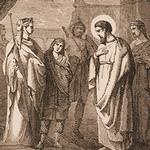Catholic Dictionary
Find accurate definitions of over 5,000 Catholic terms and phrases (including abbreviations). Based on Fr. John Hardon's Modern Catholic Dictionary, © Eternal Life. Used with permission.
Random Term from the Dictionary:
EMPIRICISM
In moral philosophy, the system of thought that claims that experience is the only valid source of knowledge. This is more than saying that experience is a presupposition to all human knowledge or a test of that knowledge once gained. It holds that the mind can regulate only the data of experience. All so-called universal ideas and all judgments in which people speak of the nature of things, according to empiricists, are not universals or natures at all. They are merely a series of sense data drawn from experience and connected by reason in a variety of relationships, but their value remains purely hypothetical. As a result, there can be no universally true propositions for the mind to accept, and no universally binding laws for the will to obey, since all knowledge is conditioned by one's limited past experience, and unpredictable experience still to come. (Etym. Greek empeirikos, experienced.)






